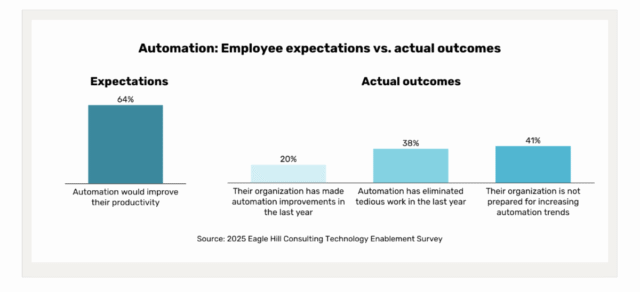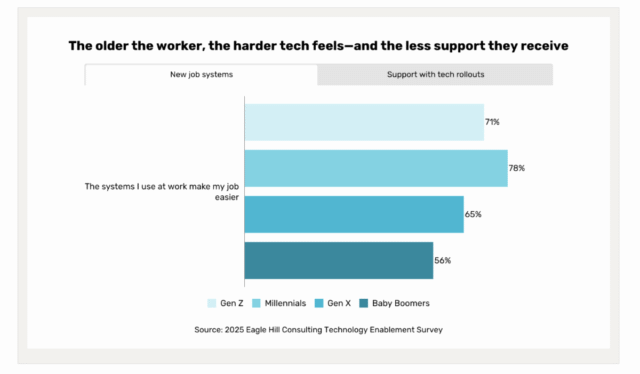
The latest Technology Enablement Survey from Eagle Hill Consulting shows that most US employees use workplace technology and believe it can improve productivity.
But despite this, many organizations are missing opportunities by failing to take a people-focused approach, which can limit the adoption of the automation and AI tools that employees say they need in order to work more effectively.
SEE ALSO: Some employees feel so pressured to use AI, they’re pretending they are
The survey of more than 1,400 U.S. workers found that 79 percent use technology in their daily work, and 69 percent say it makes their job easier.
Sixty-four percent believe automating repetitive tasks would boost productivity, yet only 38 percent report that automation has actually removed tedious tasks in the past year.
Just 20 percent say their organization has improved automation over that period, and 41 percent feel their workplace is unprepared for the rising trend of automation.

Generational differences are also apparent. Among employees aged 58 and older, only 56 percent say technology makes their jobs easier, which is 13 points below the overall workforce.
In addition, 43 percent of this age bracket say they receive inadequate support during technology rollouts, compared to 33 percent of all workers.

The data suggest that AI adoption remains slow. Sixty-seven percent of employees are not using AI at work, yet more than half of these non-users say they want to learn.
With AI emerging as an important driver of business performance, 41 percent of workers believe their organization is not prepared to adapt to its growth.
“Employees clearly see the promise of technology, automation, and AI, but too often these tools are rolled out without aligning them to actual workflows or providing adequate support, especially for seasoned employees who hold critical institutional knowledge,” said Melissa Jezior, president and CEO of Eagle Hill Consulting.
“Organizations that put people at the center of their tech strategies by involving employees early, redesigning processes, and addressing generational needs will see the greatest returns in productivity, morale, and long-term success.”
When technology improvements are implemented, employees report benefits such as faster access to information (33 percent), quicker task completion (32 percent), and improved work quality (28 percent).
The survey also found that when technology rollouts are paired with redesigned processes, workers are more than twice as likely to see improvements in speed, access, and quality.
Conducted by Ipsos in May 2025, the 2025 Eagle Hill Consulting Technology Enablement Survey included 1,436 respondents from a random sample of US employees, with additional input from government workers.
What do you think about the way companies are rolling out workplace technology? Let us know in the comments.
Image credit: Thawatchai Chawong/Dreamstime.com

